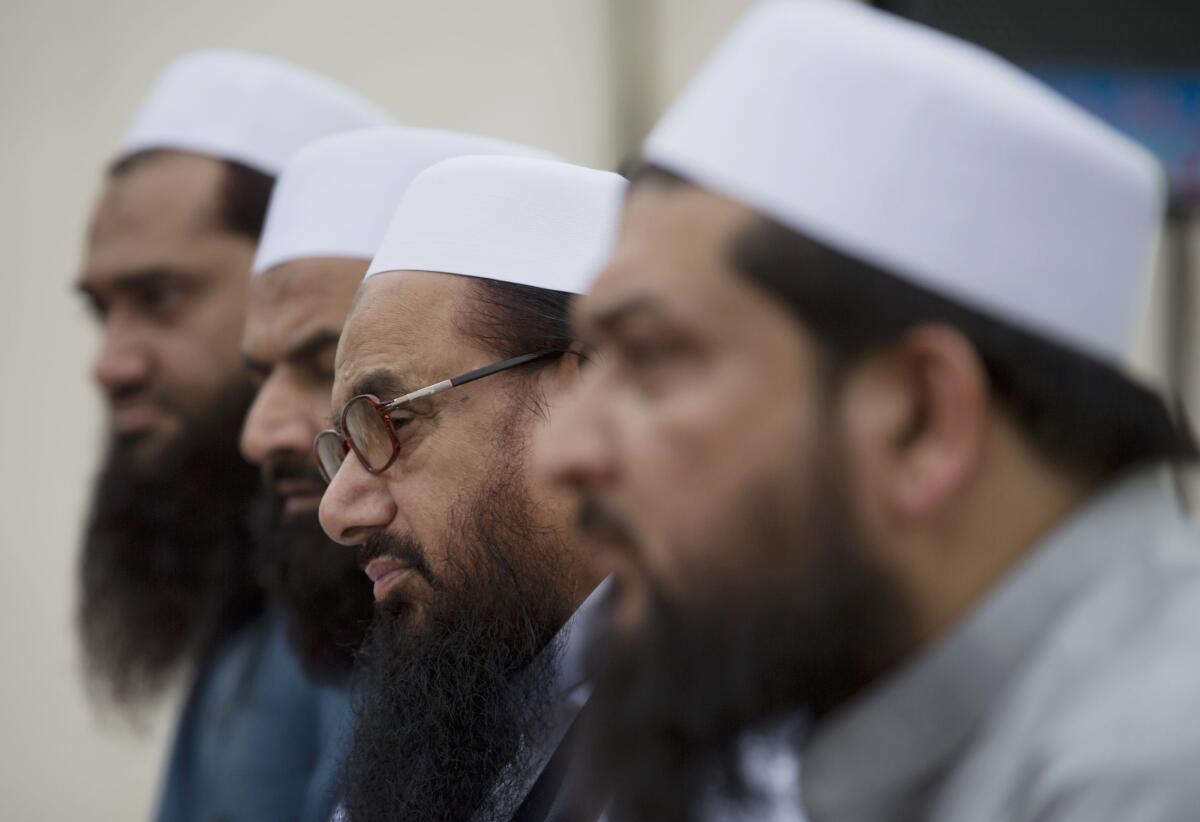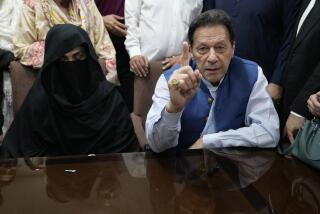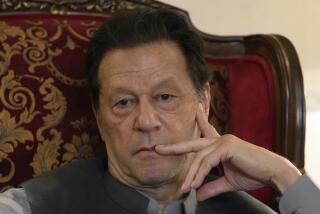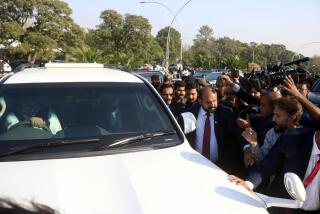Trump touts ‘ten year search’ for Pakistani militant, but everyone knew where he was

Days before Prime Minister Imran Khan was due to visit Washington, Pakistan attempted to smooth things over with President Trump on Wednesday by announcing the arrest of a notorious militant leader who has been living openly for years despite a $10-million U.S. bounty.
Hafiz Muhammad Saeed, founder of the Lashkar-e-Taiba militant group that allegedly carried out the 2008 attacks in Mumbai, India, was taken into custody at a police station in Punjab province when he went to seek bail in a terrorism financing case, Pakistani authorities said.
The arrest was not unexpected: Pakistan has detained and released Saeed several times before, most recently in 2017, when he served 10 months under house arrest. India and the U.S. have long accused the Pakistani security establishment of protecting the militant leader, who maintains a large following in his home city of Lahore.
Yet President Trump immediately sought to claim credit for Saeed’s latest arrest, tweeting that it was the result of a “ten year search” and that “great pressure has been exerted over the last two years to find him.”
That statement flew in the face of the facts: Saeed has lived openly in Lahore for years, runs a well funded Islamic charity organization, regularly gives sermons to large audiences and occasionally meets with foreign news media. The $10-million bounty was instituted in 2009, by the Obama administration.
Experts called the arrest a transparent table-setting move by Pakistan before Khan meets with Trump on Monday, the first encounter between the two leaders since Khan was elected last summer.
“If Saeed is hanging out giving fiery sermons in Pakistani stadiums, then the government clearly isn’t doing much,” said Alyssa Ayres, senior fellow for South Asia at the Council on Foreign Relations. “So Khan needs to be able to have a bare minimum set of actions to point to in his upcoming meetings with Trump.
“Not that anyone believes Saeed will be detained for long, let alone ever brought to justice for the Mumbai attacks.”
Trump’s praise for the arrest was at odds with his sharp criticism of Pakistan’s selective approach to tackling terror groups that use the country as a base to attack U.S. forces. Last year, after a series of angry exchanges, Trump withheld some security assistance from Pakistan, which once received more than $3 billion in U.S. aid annually for its support in counterterrorism.
Critics of the Pakistani security establishment said Trump had been fooled into believing that Saeed’s arrest was a major accomplishment.
“Finding [Saeed] was never an issue,” tweeted Husain Haqqani, a former Pakistani ambassador to Washington, adding that Trump should “immediately fire whoever gave him the wrong information.”
“New U.S. president, same old Pakistani trick,” tweeted Nitin Pai, co-founder of the Takshashila Institution, an Indian research organization.
In recent months, Saeed had been living in his house in the Johar Town section of Lahore, one of Pakistan’s largest cities, guarded by private security personnel with “no bar on his movements,” said Mubashir Bukhari, a Lahore-based journalist. During last year’s elections, Saeed held several rallies to support candidates in Lahore and other cities.
His virulent opposition to India, Pakistan’s blood rival, has made Saeed a folk hero to tens of thousands of followers.
Pakistan has been under additional pressure to crack down on Saeed — but mainly from the Financial Action Task Force, a Paris-based watchdog that has threatened to blacklist the country for failing to do enough to combat terrorism financing and money laundering.
Such a move could lead to sanctions by Western countries, further crippling Pakistan’s struggling economy just as it secured a $6-billion bailout from the International Monetary Fund.
Last year, Pakistan banned Saeed’s Jamaat-ud-Dawa charitable organization, and this month authorities lodged nearly two dozen cases against him and his aides for allegedly soliciting donations for Lashkar-e-Taiba, which the U.S. and India accuse of carrying out the 2008 Mumbai attacks that killed more than 160 people.
Special correspondent Sahi reported from Islamabad and Times staff writer Bengali from Singapore.
More to Read
Start your day right
Sign up for Essential California for news, features and recommendations from the L.A. Times and beyond in your inbox six days a week.
You may occasionally receive promotional content from the Los Angeles Times.







